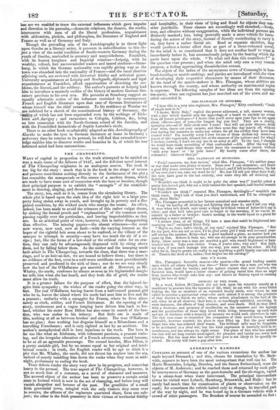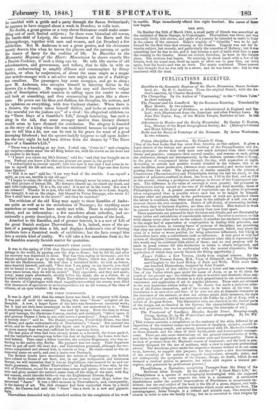ANDERSEN'S RAMBLES
CONTAINS an account of one of the various excursions the author has made beyond Denmark ; and this, chosen for translation by Mr. Beck- with, appears to have been the most unimportant that well can be. The Hartz Mountains, Leipzig, Dresden, and the Saxon Switzerland, were the objects of M. Andersen; and he reached them and returned by such pub- lic conveyances of Germany as the post-kutsche and the eil-wageu, varied by a steam-boat when water intervened. The principal intermediate towns he visited were Lubeck, Hamburg, Brunswick, and Halle : bat he rarely had much time for examination of places or observation on the road ; for sometimes the vehicle halted only to change, he travelled part of the way by night, and he was boxed up in a German vehicle with crowd of other passengers. The Brocken of coarse he ascended on foot; he rambled with a guide and a party through the Saxon Switzerland; he appears to have stopped about a week in Dresden; et voila tout. No doubt, a great genius or a very clever litterateur could make some- thing out of such limited subjects ; for there were historical old towns, the battle-field of Leipzig, the natural features of the Hartz and the Beisengeberge, together with men and women, and (at Dresden) a few celebrities. But M. Andersen is not a great genius, and his cleverness mostly deserts him when he leaves the players and the patrons, or quits the mazes of fancy for the realities of life. In Rambles in the Romantic Regions of the Harts Mountains he shows exactly like a Danish Cockney, if such a thing can be. He tells idle stories of old schoolmasters, and governesses, and tailors, that he falls in with en route; endeavouring to amplify silliness and commonplace by flimsy fancies, or often by conjectures, of about the same staple as a maga- zine article-monger with a talkative turn might spin out of a Padding- ton omnibus. The passengers buy some nosegays, and go to sleep ; save M. Andersen, who occupies himself in fancying fairies in the flowers (in a dream). He engages in that easy and therefore vulgar style of description which consists in calling upon the reader to come and look at something, and then enumerating its parts like a show- man. He pours out his likes and dislikes, his thoughts, his notions, and his opinions on everything, with true Cockney chatter. When there is a theatre, the tourist takes himself thither, and looks at matters with "the scornful yet the jealous eye" of a rival : his allegorical criticism on the "Three Days of a Gambler's Life," though lumbering, has such a sting in the tail, that some stronger motive than literary distaste would seem to have dictated the conclusion. The allegory is founded on the story of a king whose life was embittered because he could get no one to tell him a lie, nor can he rest in his grave for want of a good thumping falsehood; but the spectre luckily happens to call upon Ander- sen the very night he had been driven from the theatre by "The Three Days of a Gambler's Life."
"There was a knocking at my door. I cried out, Come in!' and—imagine my surprise—there stood the old King before me, with his crown on his head and his sceptre in his hand.
" heard you relate my life's history,' said he; 'and that has brought me to you. Perhaps you know a lie that can procure me peace in the grave? "I endeavoured to recover myself; told him how it was that I had come to re- late to myself his life and acts, and then mentioned Drei Tage sus dem Leben sines Spielers.' "'Tell it to me!' said he; 'I am very fond of the terrible. I am myself a spirit, as you see terrible in my old age.' "I began to relate the whole to him; went through scene by scene, and showed Iffin that picture of human life. His features cleared up; be seized my hand, and aid with enthusiasm, 'It is a lie, my 'son ! it is not so in the world. But now I am released! Thanks be to you, who told me this; thanks be to Louis Angely, who brought it out on the stage; but blessed be Victor Ducange, who wrote it! Now I shall have peace in the grave !' and then he vanished."
The criticism of the old King may apply to these Rambles of Ander- sen quite as well as to the melodrama of Ducange ; for anything more matterless or unreal we have rarely met with. There is scarcely an in- cident, and no information : a few anecdotes about nobodies, and oc- casionally a pretty description, form the relieving portions of the book. Attached to the Rambles, and of greater interest, is a a sort of Life of the great Danish sculptor Thorwaldsen. It is, indeed, more of the na- ture of a panegyric than a life, and displays Andersen's vice of forcing incidents into a theatrical mode of exhibition ; but the facts compel him into a certain kind of reality. We will take a few anecdotes from it; for the Rambles scarcely furnish matter for quotation.
THORWALDSEN'S FIRST LOVE.
It was in the spring of 1796 that Thorvaldsen intended to commence his wan- derings in the world, by passing over the Alps to Rome: but be fell ill, and after his recovery was depressed in mind. War was then raging in Germany; and his friends advised him to go by the royal frigate Thetis, which was just about to sail for the Mediterranean. He had then a betrothed bride; he took an honest, open-hearted farewell, and said, "Now that I am going on my travels, you shall not be bound to me: if you keep true to me, and Ito you, until we meet again some years hence, then we will be united." They separated; and they met again, many, many years afterwards, shortly before his death, she as a widow, he as Europe's eternally young artist. When Thorvaldsen's corpse was borne through the streets of Copenhagen with royal magnificence—when the streets were filled with thousands of spectators in mourning—there sat an old woman, of the class of citizens, at an open window: it was she.
THE FIRST COMMISSION.
It was in April 1801 that his return home was fixed, in company with Zoega. It was put oft until the autumn. During this time "Jason" occupied all his thoughts. A new a larger figure of the hero was formed—an immortal work; but it had not then been announced to the world, nor understood by it. " Here is something more than common!" was said by many. Even the man to whom all paid homage, the illustrious Canova, started, and exclaimed, "Quest' opera di euel giovane Danese e fatta in uno stile nuovo e grandiose!" Zoega smiled. " It is bravely done!" said he. The Danish songstress, Frederikke Bruno, was then in Rome, and spoke enthusiastically of Thorvaldsen's "Jason." She assisted the artist, and he was enabled to get this figure cast in plaster; for he himself had no more money than was just sufficient for his expenses home.
The last glass of wine had been already drunk as a farewell, the boxes packed, and the vetturino's carriage was before the door at daybreak; the boxes were fast- ened behind. Then came a fellow traveller, the sculptor Hagemann, who was re- turning to his native city, Berlin. His passport was not ready. Their departure must be put off until the next day; and Thorvaldsen promised, although the vet- hula° complained and abused him, to remain so long. He staid—staid to win an immortal name on earth, and cast a lustre over Denmark. The British bombs have demolished the towers of Copenhagen; the British have robbed us Danes of our fleet; but, in our just indignation and bitterness thereat, we will remember that it was an Englishman who rescued for us and our land's greatness, thee, Albert Thorvaldsen ! an Englishman it was who, by the will of Providence, raised for us more than towers and spires; who cast more ho- nour and glory around the nation's name than all the ships of the land, with flag and cannon, could thunder forth—it was the Englishman Thomas Hope. In the little studio which the artist was about to leave stood Hope, before the uncovered "Jason." It was a life's moment in Thorvaldsen's, and, consequently, in the history of art. The rich stranger had been conducted there by a hired guide; for Canova had said that " Jason" was a work in a new and gigantic style.
Thorvaldsen demanded only six hundred zechins for the completion of his work in marble. Hope immediately offered him eight hundred. His career of fame now began.
THE END.
On Sunday the 24th of March 1844, a small party of friends was assembled at the residence of Baron Stampe, in Copenhagen. Thorvaldsen was there, and was unusually lively, told stories, and s ke of a journey he intended to make to Italy in the course of the summer. H 's tragedy of " Griseldis " was to be per- formed for the first time that evening at the theatre. Tragedy was not his fa- vourite subject, but comedy, and particularly the comedies of Heiberg; but it was something new he was to see, and it had become a sort of habit with him to pass the evening in the theatre. About six o'clock, therefore, he went to the theatre alone. The overture had begun. On entering, he shook hands with a few of his friends, took his usual seat, stood up again to allow one to pass him, sat down again, bent his head—and was no more. The music continued. Those nearest to him thought that he was only in a swoon, and he was borne out: but he was numbered with the dead.



























 Previous page
Previous page